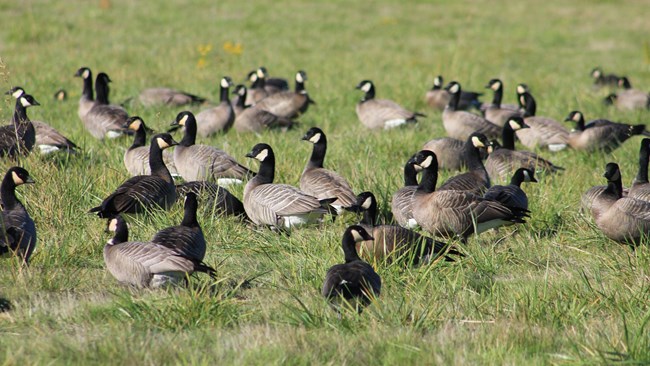Last updated: January 14, 2025
Article
Ridgefield National Wildlife Refuge

USFWS
Traveling down the Columbia River on November 4, 1805, the expedition passed a large Watlala village near here with more than 200 people and many canoes. They camped on the north shore, downstream from the village. The area was thick with waterfowl, and Clark noted that they had difficulty sleeping that night with the noise from swans, geese, ducks, and cranes.37
Waterfowl rely on specific habitat, food sources, and migration route conditions. Established in 1964, Ridgefield National Wildlife Refuge preserves pasture, marshes, floodplain forest, and oak woodlands to ensure habitat for waterfowl and other wetland wildlife. Anticipating increased flooding and higher temperatures due to climate change, the refuge is developing strategies to address these effects. These efforts include invasive species control, pasture management for migrating geese, and water control and rotation plans to increase seasonal wetlands productivity.38
Citations:
37 NPS, “Ridgefield National Wildlife Refuge,” Pittsburgh to the Pacific: High Potential Historic Sites of the Lewis and Clark National Historical Trail, 2022, 87, https://www.nps.gov/lecl/getinvolved/upload/2022_LCNHT_HPHS_Report_508compliantUPDATE-2.pdf; William Clark, November 4, 1805 entry, in Gary E. Moulton, Journals of the Lewis and Clark Expedition, https://lewisandclarkjournals.unl.edu/item/lc.jrn.1805-11-04; William Clark, November 5, 1805 entry, in Moulton, Journals of the Lewis and Clark Expedition, https://lewisandclarkjournals.unl.edu/item/lc.jrn.1805-11-05.
38 U.S. Fish and Wildlife Service (USFWS), “Ridgefield National Wildlife Refuge Draft Comprehensive Conservation Plan and Environmental Assessment,” May 2010, 2-5, 2-9, 3-8–3-9, https://ecos.fws.gov/ServCat/DownloadFile/173051; USFWS, “Ridgefield National Wildlife Refuge,” accessed August 26, 2024, https://www.fws.gov/refuge/ridgefield/about-us.
